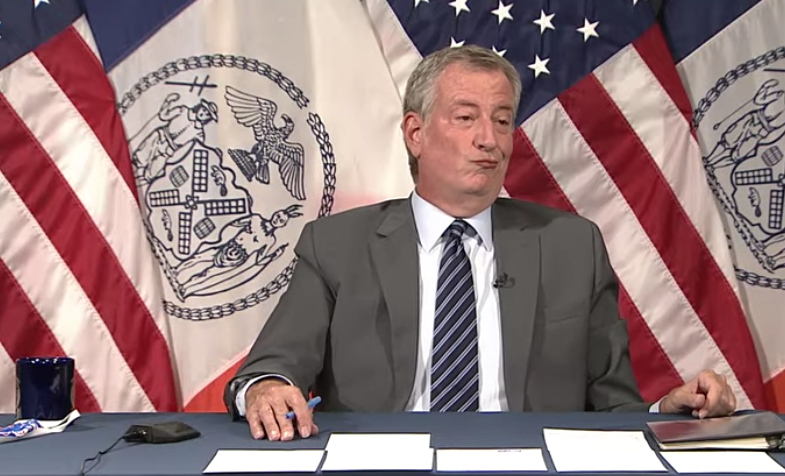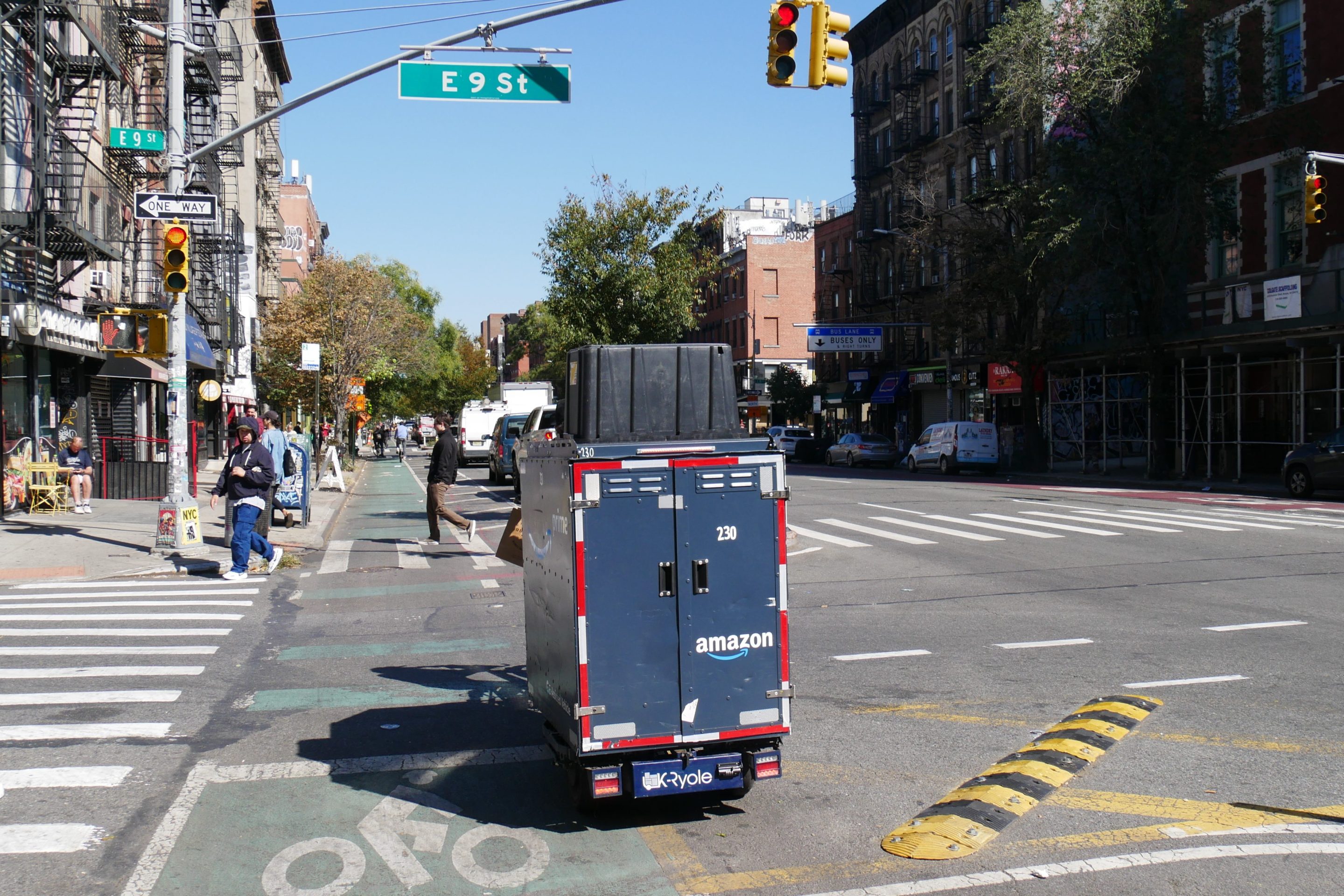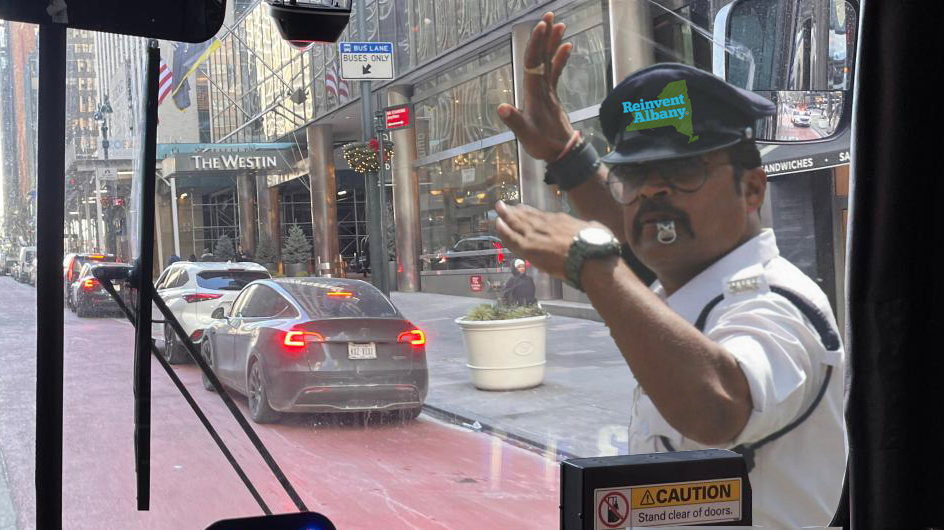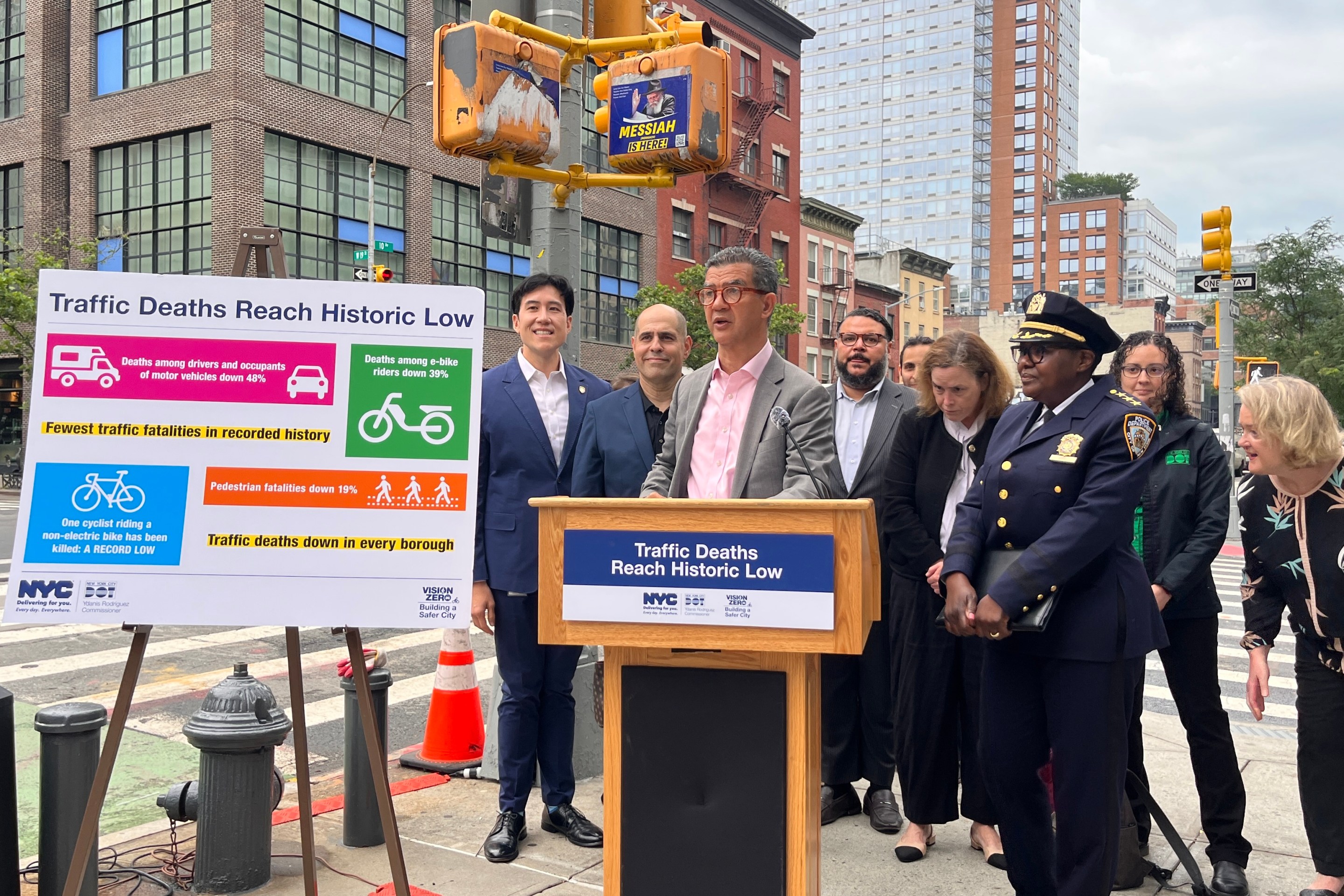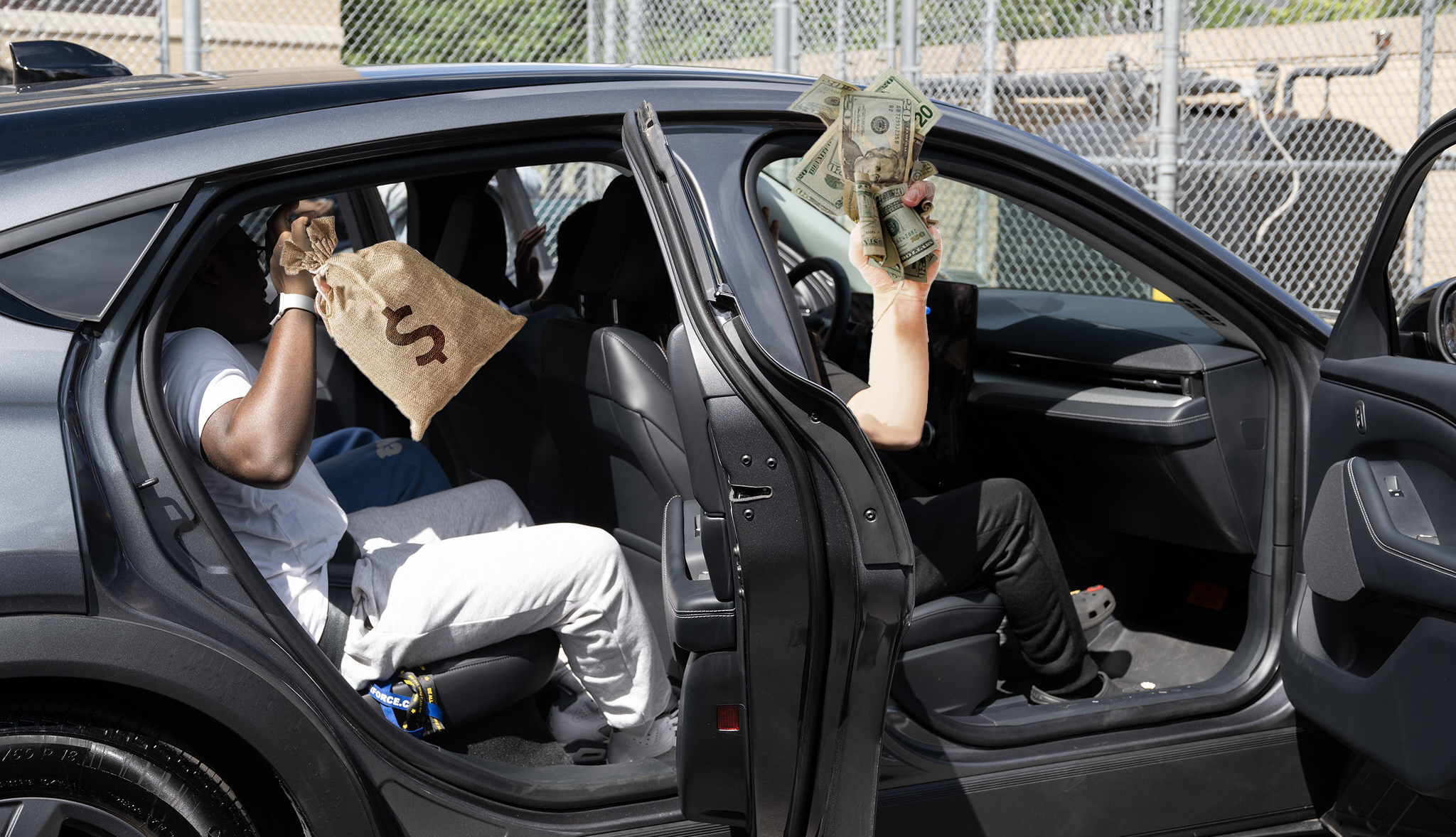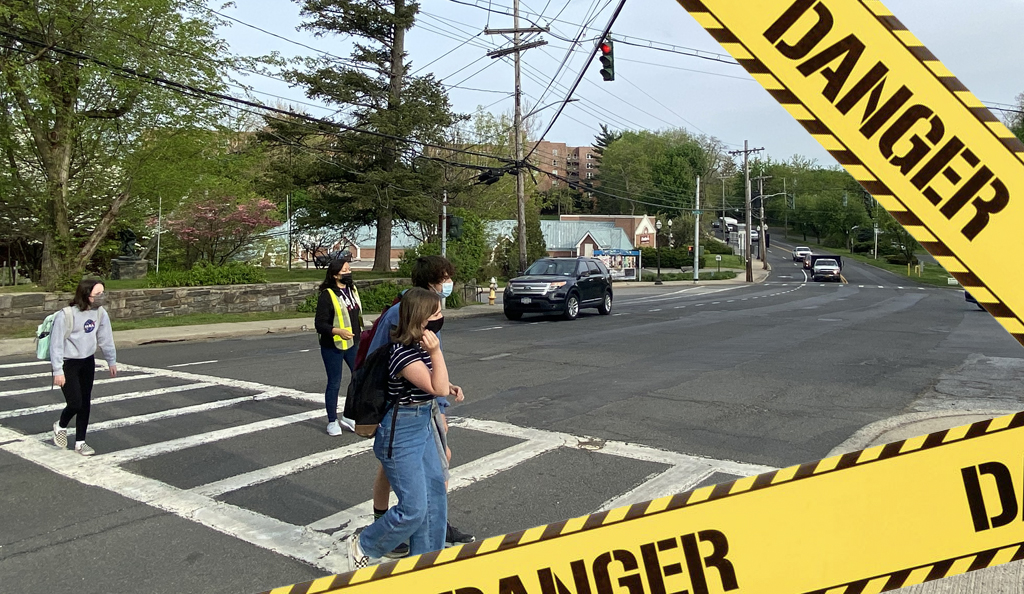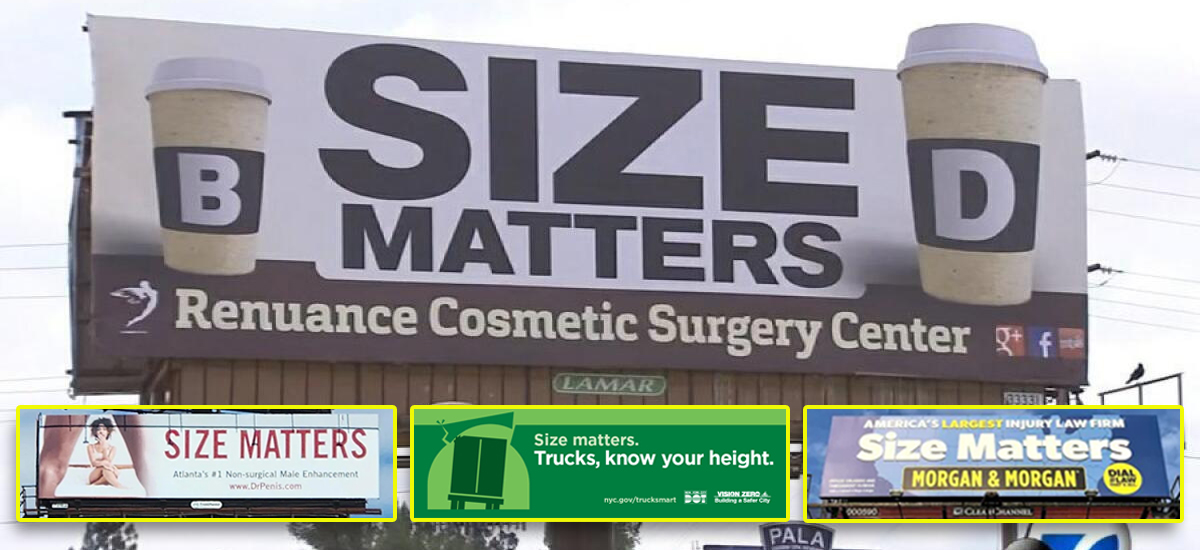Expedite this!
Mayor de Blasio took aim at the supposed 16-month timeline for the MTA's environmental assessment of congestion pricing, repeatedly saying that it was "ridiculous" to suggest that was a quick study.
"Do I buy that timeline? No," the mayor said at his press conference on Tuesday morning. "I'd like to meet the person who thinks 16 months is expedited, that's ridiculous. If they want to know the environmental impact, I'll tell them: It will reduce congestion, it will reduce pollution. I just think this is getting a little ridiculous."
De Blasio's comments came after MTA officials told the New York Times that it would take 16 months for the agency to complete its required and long-delayed environmental assessment on the vital Midtown toll plan, a timeline that means that the congestion pricing can't possibly start until 2023, but more likely 2024. In addition to the far-out timeline, congestion pricing may also face headwinds from Lt. Gov. Kathy Hochul, who told the paper that she was reassessing her support of the program in light of the COVID pandemic.
The governor, her spokesman said, will have to evaluate "the pace and timing ... given the constantly changing impact of COVID-19 on commuters." In response, de Blasio said that he would stress to Hochul at a subsequent meeting the ongoing impact of COVID: traffic-choked streets even before the post-Labor Day influx of office workers into the city.
"If our subways and buses aren't working, our whole city isn't working," said de Blasio, who long opposed what he called a "regressive tax" on drivers ... until he finally accepted the logic of tolling them to raise money for transit and to reduce congestion and pollution. "As a result of COVID, we have an even greater congestion problem, and we've got to improve subway and bus service to keep getting people to come back to mass transit. Congestion pricing is crucial on so many levels, and I definitely want to talk that through with her."
Hochul also got some pushback from the legislature on Tuesday.
"Kathy Hochul's first steps on congestion pricing have not been heartening," said Deputy Majority Leader Michael Gianaris, a Queens Democrat and congestion pricing supporter. "It has been delayed long enough and needs to move post-haste.
"The bottom bottom line is [congestion pricing] is more necessary than ever. As the city is reopening, people seem to be more willing to be in their cars than they used to be, so even though the number of people in the city is not at pre-pandemic levels, the traffic has already reached pre-pandemic levels," Gianaris added. "It's only going to get worse as more people commute back and forth as we reopen. It's just got to happen, there's no option here to be at the center anymore."
Gianaris also said that Albany Democrats weren't afraid of congestion pricing as a 2022 campaign issue, even if the environmental assessment schedule intersects with the midterm election schedule.
"I'm not concerned about that," he said. "We have shown the last three years that taking bold, forward looking steps that change the way we do things has been rewarded. There's a long list of things we were supposed to suffer for that we did in 2019 and 2020, and we came back with the largest majority the Senate's ever had. I'm not concerned with doing the right thing."
Of course, one of the people who sounded copacetic about the 16-month EA process was Interim MTA Chairman and CEO Janno Lieber, who said this week that the schedule was impressive in light of previous environmental studies the MTA has had to complete.

"It took me two years to get the Penn Station Access and MetroNorth service for the Bronx, a two year environmental assessment to put a couple more trains on an existing Amtrak line," Lieber told reporters on Monday after the Times story broke the news of that the agency was foreseeing an 16-month EA (up from just four months, as Streetsblog reported). "But what we're working towards with the feds is 16 months for a project that's not just one line. It encompasses 28 counties, 22 million people, and the most extensive outreach, including environmental justice outreach, that's ever been done. We're excited that the schedule that we're working with [New York] State DOT and the federal government is really really aggressive, and it's going to deliver congestion pricing promptly."
The MTA also claims that the person holding up the congestion pricing process is ... Mayor Bill de Blasio.
"We’re mystified by the mayor’s statement," said Lieber's senior adviser Ken Lovett. "The planned 16-month schedule was the result of months and months of negotiations between the USDOT and MTA, the state Department of Transportation and the mayor’s own city DOT. By throwing his own DOT professionals under the bus and refusing to provide the sign off that is required by the federal government, City Hall has already delayed the start of this project by two weeks and threatens to impose even further delays.
The "sign off" referenced in the statement is City Hall approval of the schedule for the environmental assessment, which Lovett says has been missing for weeks. Said schedule involves how long the environmental assessment takes, what takes place after it and other dates for the project, according to Lovett.
"We've been working hand in glove with the city DOT on this schedule. And then we can go to the feds and say all the parties are on board, and the feds would hopefully say all right, yeah, give a letter to proceed, and then we start the public outreach people are so desperate for," he said.
The mayor’s comments on Tuesday come as a key community board inside the congestion zone demanded a faster pace, too.
In a letter sent to Gov. Cuomo and future Gov. Hochul on Tuesday, Community Board 4 demanded that congestion pricing "be implemented as soon as possible to relieve our district from the extreme traffic that has overtaken our neighborhood since the COVID reopening.”
"Vehicular congestion has increased dramatically since the beginning of the COVID reopening,threatening to stall economic recovery. Small Businesses complain of loss of revenue due to customer and delivery delays. Noise resulting from honking during gridlock prevents restaurants from benefitting from outdoor dining. Residents remain inside and won’t visit retail shops in order to avoid the chaos, confusion, and lack of safety,” added the letter, which came after a 26-4 pro-congestion pricing vote.
The letter also offered two controversial proposals:
- “That parking regulations outside the boundaries of the Congestion Zone be adjusted to prevent out-of-area drivers from parking outside the Zone in order to avoid the entry charge.” This suggestion brings to mind the longstanding debate over residential parking permits, which seek to prevent drivers from using residential neighborhoods as parking lots, but studies show that such permits tend to increase car ownership within the permit zone by encouraging people to buy cars they might not otherwise have purchased.
- That New Jersey drivers using the Lincoln not only pay the existing Port Authority toll (which should be made both ways rather than just inbound from Jersey, the letter says), but that they also pay the congestion zone toll, too. The existing toll, the letter stated, "is inadequate to dissuade New Jersey drivers from using their automobiles to come to the Central Business District.”
But congestion pricing expert Charles Komanoff, who is certainly no fan of excessive exemptions, disagreed with that part of the board’s letter.
"Imposing the congestion toll in addition [to the existing toll] would thus entail charging those trips roughly twice as much as others entering the CBD,” Komanoff said "That would run counter to basic equity -- an auto entering via a tunnel doesn't cause more congestion harm than an auto entering via an East River bridge or by crossing 60th Street; why, then, should they pay twice as much?”
He added that both tunnels from New Jersey comprise just 14 percent of all vehicles bound for the central business district that would be subject to the congestion toll. Komanoff said the MTA should be willing to forgo the revenue from already tolled Garden Staters in exchange for not throwing "gasoline on the fire of New Jersey opposition to congestion pricing in any form.”
Komanoff also pointed out that even if he and CB4 disagree on one tiny part of the overall plan, the overall plan must go forward quickly.
"Congestion pricing is so essential to our city's — including CB4's — immediate and long-term futures, that we should think long and hard before proposing adjustments that, no matter how well-intentioned, run the risk of thwarting the entire enterprise,” he said.
— with Gersh Kuntzman at the bottom
CB 4 Letter to Gov. Cuomo Re Congestion Pricing by Gersh Kuntzman on Scribd
